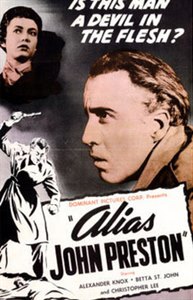Alias John Preston is a 1955 British 'B'[1] thriller film directed by David MacDonald and starring Christopher Lee, Betta St. John and Alexander Knox.[2][3] A mysterious and wealthy man moves to a small village where he outwardly appears to be a friendly figure but nurses a dangerous secret.[4]
| Alias John Preston | |
|---|---|
 | |
| Directed by | David MacDonald |
| Written by | Paul Tabori |
| Produced by | Edward J. Danziger Harry Lee Danziger Sidney Stone (as Sid Stone) |
| Starring | Christopher Lee Alexander Knox Betta St. John |
| Cinematography | Jack E. Cox (as Jack Cox) |
| Edited by | Jack Baldwin Cynthia Moody |
| Music by | Edwin Astley Albert Elms |
Production company | Danziger Productions (as Danziger Photoplays) |
| Distributed by | British Lion Film Corporation (UK) |
Release date |
|
Running time | 66 minutes |
| Country | United Kingdom |
| Language | English |
Cast
edit- Christopher Lee as John Preston
- Betta St. John as Sally Sandford
- Alexander Knox as Doctor Peter Walton
- Sandra Dorne as Maria
- Patrick Holt as Sylvia's husband in dream (as Pat Holt)
- John Stuart as Doctor Underwood
- Bill Fraser as Joe Newton
- Peter Grant as Bob Newton
- Betty Ann Davies as Mrs Sandford
- John Longden as Richard Sandford
Critical reception
editThe Monthly Film Bulletin wrote: "This static and stagey melodrama is unimaginatively handled, finishing with a trick ending which explains remarkably little. Alexander Knox, as the psychiatrist, brings some degree of plausibility to the proceedings, but the playing generally is characterless."[5]
Chibnall and McFarlane in The British 'B' Film wrote: "It was a pretty botched job, over-played and under-plotted."[1]
Leslie Halliwell said: "Watchable second feature."[6]
In British Sound Films: The Studio Years 1928–1959 David Quinlan rated the film as "poor", writing: "Dreary, turgid drama: seems much longer than it is."[7]
TV Guide called the film "a poorly developed psychological drama",[8] while Allmovie described it as "an average psychological mystery worth watching for the good performances."[9]
In Offbeat: British Cinema's Curiosities, Obscurities and Forgotten Items, Jennifer Wallis wrote: "The Danzingers' high speed production accounts for the short running time. ...In the context of such whistle-stop production, Alias John Preston is an impressive feat, and in no way a bad film per se. Its tightly compacted plot and self-conscious intensity, though, tire the viewer before becoming somewhat infuriating in their transparency."[10]
References
edit- ^ a b Chibnall, Steve; McFarlane, Brian (2009). The British 'B' Film. London: BFI/Bloomsbury. p. 126. ISBN 978-1-8445-7319-6.
- ^ "Alias John Preston". British Film Institute Collections Search. Retrieved 13 February 2024.
- ^ "Alias John Preston (1955)". BFI. Archived from the original on 13 January 2009.
- ^ "Alias John Preston (1956)". rotten tomatoes. Retrieved 29 May 2012.
- ^ "Alias John Preston". The Monthly Film Bulletin. 23 (264): 102. 1 January 1956 – via ProQuest.
- ^ Halliwell, Leslie (1989). Halliwell's Film Guide (7th ed.). London: Paladin. p. 21. ISBN 0586088946.
- ^ Quinlan, David (1984). British Sound Films: The Studio Years 1928–1959. London: B.T. Batsford Ltd. p. 277. ISBN 0-7134-1874-5.
- ^ "Alias John Preston". TVGuide.com.
- ^ Michael P. Rogers. "Alias John Preston (1956) - David MacDonald - Synopsis, Characteristics, Moods, Themes and Related - AllMovie". AllMovie.
- ^ Wallis, Jennifer (2022). "Alias John Preston". In Upton, Julian (ed.). Offbeat: British Cinema's Curiosities, Obscurities and Forgotten Items (2nd ed.). Headpress. pp. 21–22. ISBN 9781909394933.